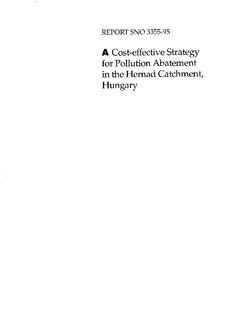A Cost-effective Strategy for Pollution Abatement in the Hernad Catchment, Hungary
Research report
Permanent lenke
http://hdl.handle.net/11250/208553Utgivelsesdato
1996Metadata
Vis full innførselSamlinger
- NIVA-rapporter [7006]
Sammendrag
The overall aims of this study are to elaborate tools for a more cost-effective and recipient oriented water management, and to conduct a specific abatement analysis in the Hernad catchment area. The Hernad river is transboundary. It has its source in Slovakia, and enters Hungary in the north -eastern part of the country. 19 % of the catchment area is in Hungary, of which crop area is predominant. Five different water quality objectives have been proposed, based on user interests and general water quality criteria. Nitrogen inputs, especially ammonia, are the most important inputs to be reduced. This implies also a reduction of BOD. Reduction of phoshorus is important if the drinking water quality should be achieved throughout the river. The most important measures to be implemented in the municipal sector is building of wastewater treatment plants for 23 of the most important municipalities ("hot-spots"), which will reduce BOD, nitrogen and phosphorus inputs. Agricultural measures include better manure handling, spring tillage of the soil and better utilisation of manure. The objectives will only partly be met by implementing measures on the Hungarian side. Measures must also be implemented on the Slovakian side to meet the user requirements, and to secure a cost-effective approach through the entire catchment area.

